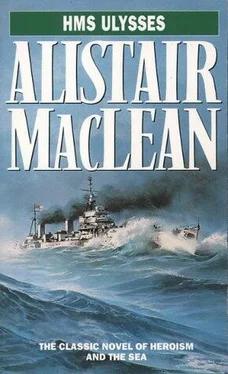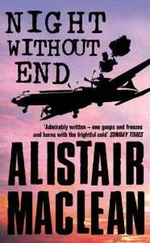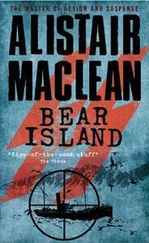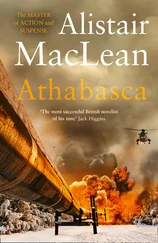The weather changed just before the end of the middle watch. The seas did not change-FR77 was still butting into the heavy, rolling swell from the north, still piling up fresh sheets of glistening ice on their labouring fo'c'sles. But the wind dropped, and almost at once the snowstorm blew itself out, the last banks of dark, heavy cloud drifting away to the south. By four o'clock the sky was completely clear.
There was no moon that night, but the stars were out, keen and sharp and frosty as the icy breeze that blew steadily out of the north.
Then, gradually, the sky began to change. At first there was only a barely perceptible lightening on the northern rim then, slowly, a pulsating flickering band of light began to broaden and deepen and climb steadily above the horizon, climbing higher to the south with the passing of every minute. Soon that pulsating ribbon of light was paralleled by others, streamers in the most delicate pastel shades of blue and green and violet, but always and predominantly white. And always, too, these lanes of multi-coloured light grew higher and stronger and brighter: at the climax, a great band of white stretched high above the convoy, extending from horizon to horizon... These were the Northern Lights, at any time a spectacle of beauty and wonder, and this night surpassing lovely: down below, in ships clearly illumined against the dark and rolling seas, the men of FR77 looked up and hated them.
On the bridge of the Ulysses, Chrysler, Chrysler of the uncanny eyesight and super-sensitive hearing, was the first to hear it. Soon everyone else heard it too, the distant roar, throbbing and intermittent, of a Condor approaching from the south. After a time they became aware that the Condor was no longer approaching, but sudden hope died almost as it was born. There was no mistaking it now-the deeper, heavier note of a Focke-Wulf in maximum climb. The Commander turned wearily to Carrington.
"It's Charlie, all right," he said grimly. "The bastard's spotted us.
He'll already have radioed Alta Fjord and a hundred to one in anything you like that he's going to drop a marker flare at 10,000 feet or so.
It'll be seen fifty miles away."
"Your money's sake." The First Lieutenant was withering. "I never bet against dead certs... And then, by and by, maybe a few flares at a couple of thousand?"
"Exactly!" Turner nodded. "Pilot, how far do you reckon we're from Alta Fjord-in flying time, I mean?"
"For a 200-knot plane, just over an hour," the Kapok Kid said quietly. His ebullience was gone: he had been silent and dejected since Vallery had died two hours previously.
"An hour!" Carrington exclaimed. "And they'll be here. My God, sir," he went on wonderingly, "they're really out to get us. We've never been bombed nor torpedoed at night before. We've never had the Tirpitz after us before. We never------"
"The Tirpitz," Turner interrupted. "Just where the hell is that ship? She's had time to come up with us. Oh, I know it's dark and we've changed course," he added, as Carrington made to object, "but a fast destroyer screen would have picked us-Preston!" He broke off, spoke sharply to the Signal Petty Officer. "Look alive, man! That ship's flashing us."
"Sorry, sir." The signalman, swaying on his feet with exhaustion, raised his Aldis, clacked out an acknowledgment. Again the light on the merchantman began to wink furiously.
"'Transverse fracture engine bedplate,'" Preston read out. "'Damage serious: shall have to moderate speed.'"
"Acknowledge," said Turner curtly. "What ship is that, Preston?"
"The Ohio Freighter, sir."
"The one that stopped a tin fish a couple of days back?"
"That's her, sir."
"Make a signal. 'Essential maintain speed and position.'" Turner swore. "What a time to choose for an engine breakdown... Pilot, when do we rendezvous with the Fleet?"
"Six hours' time, sir: exactly."
"Six hours." Turner compressed his lips. "Just six hours, perhaps!" he added bitterly.
"Perhaps?" Carrington murmured.
"Perhaps," Turned affirmed. "Depends entirely on the weather. C.-in-C. won't risk capital ships so near the coast unless he can fly off fighter cover against air attack. And, if you ask me, that's why the Tirpitz hasn't turned up yet, some wandering U-boat's tipped him off that our Fleet Carriers are steaming south. He'll be waiting on the weather...
What's he saying now, Preston?" The Ohio's signal lamp had flashed briefly, then died.
"'Imperative slow down,'" Preston repeated. "'Damage severe. Am slowing down.'"
"He is, too," Carrington said quietly. He looked up at Turner, at the set face and dark eyes, and knew the same thought was in the Commander's mind as was in his own. "He's a goner, sir, a dead duck. He hasn't a chance. Not unless------"
"Unless what?" Turner asked harshly. "Unless we leave him an escort?
Leave what escort, Number One? The Viking-the only effective unit we've left?" He shook his head in slow decision. "The greatest good of the greatest number: that's how it has to be. They'll know that.
Preston, send 'Regret cannot leave you standby. How long to effect repairs?'"
The flare burst even before Preston's hand could close on the trigger.
It burst directly over FR77. It was difficult to estimate the height, probably six to eight thousand feet, but at that altitude it was no more than an incandescent pinpoint against the great band of the Northern Lights arching majestically above. But it was falling quickly, glowing more brightly by the sound: the parachute, if any, could have been only a steadying drogue.
The crackling of the W.T. speaker broke through the stuttering chatter of the Aldis.
"W.T.-bridge. W.T.-bridge. Message from Sirrus: 'Three survivors dead. Many dying or seriously wounded. Medical assistance urgent, repeat urgent.'" The speaker died, just as the Ohio started flickering her reply.
"Send for Lieutenant Nicholls," Turner ordered briefly. "Ask him to come up to the bridge at once."
Carrington stared down at the dark broad seas, seas flecked with milky foam: the bows of the Ulysses were crashing down heavily, continuously.
"You're going to risk it, sir?"
"I must. You'd do the same, Number One.... What does the Ohio say, Preston?"
"I understand. Too busy to look after the Royal Navy anyway. We will make up on you. Au revoir!"'
"We will make up on you. Au revoir." Turner repeated softly. "He lies in his teeth, and he knows it. By God!" he burst out. "If anyone ever tells me the Yankee sailors have no guts, I'll push his perishing face in. Preston, send: 'Au revoir. Good luck.'... Number One, I feel like a murderer." He rubbed his hand across his forehead, nodded towards the shelter where Vallery lay stretched out, and strapped to his settee.
"Month in, month out, he's been taking these decisions. It's no wonder..." He broke off as the gate creaked open.
"Is that you, Nicholls? There is work for you, my boy. Can't have you medical types idling around uselessly all day long." He raised his hand.
"All right, all right," he chuckled. "I know.... How are things on the surgical front?" he went on seriously.
"We've done all we can, sir. There was very little left for us to do,"
Nicholls said quietly. His face was deeply lined, haggard to the point of emaciation. "But we're in a bad way for supplies. Hardly a single dressing left. And no anaesthetics at all-except what's left in the emergency kit. The Surgeon-Commander refuses to touch those."
"Good, good," Turner murmured. "How do you feel, laddie?"
"Awful."
"You look it," Turner said candidly. "Nicholls-I'm terribly sorry, boy-I want you to go over to the Sirrus."
"Yes, sir." There was no surprise in the voice: it hadn't been difficult to guess why the Commander had sent for him. "Now?"
Читать дальше
Конец ознакомительного отрывка
Купить книгу












